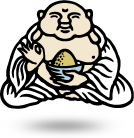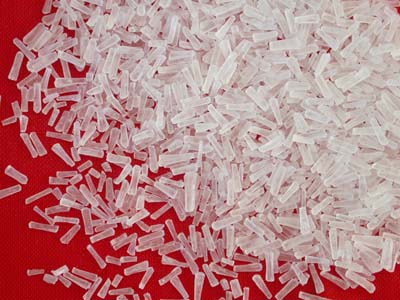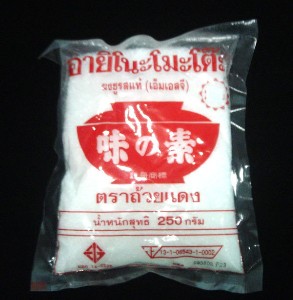The MSG Dilemma
Posted by Pailin Chongchitnant on Friday, September 16th, 2011Tags for this Article: Asian food, MSG
It’s almost inevitable that at some point in the career of an Asian chef, one faces the big decision: MSG—To use? Or not to use? In some Asian countries, such as Thailand where I come from, it’s not uncommon to find a bag of Ajinomoto, the common household brand of MSG, in the pantry. And you just add it like you would salt.
Monosodium Glutamate, at first sight, looks like sugar or salt. Upon closer inspection, you will notice that each grain is like a tiny stick—long and slim. When you taste it straight up it’s kind of salty…but then it’s also a little sweet, with a presence of that je ne sais quoi that prevents you from eating just one piece of Doritos, which of course, contains MSG. Most Thai and Chinese restaurants here in SF order it in 50lb sacks. It’s like an added assurance for good, addictive flavor. As a Thai chef, I am faced with many questions: is that cheating? Is it bad for you? Does it really make a big difference?
I see many diners turn away when they find out that the restaurant uses MSG, thinking that it’s going to give them cancer, a headache, or maybe green spots on their arms…I’m not sure, I’ve had many people report so many different reactions to MSG it’s kind of fascinating. I personally find that in very large amounts, it makes me feel insatiably thirsty and leaves kind of a numb, worn-out feeling on my tongue. But other than that it’s fine. On Food Detective, a Food Network show, an experiment was conducted and they discovered that MSG side effects are actually placebo—they only happen when diners who claim to be sensitive to MSG were told (falsely) that there is MSG in the food. No studies have proven that MSG, in the normal amounts that are used in food at least, is bad for you, which is why it remains a legal food additive worldwide.
When you are in the Asian restaurant community you hear lots of MSG stories. One was of an old Korean cook who worked in a restaurant that decided to stop adding MSG, but the cook was so unconfident without it that he would sneak it in from home and used it when working. He was just afraid people wouldn’t like his food….it’s kind of cute in my opinion.
I am currently working on a menu for new restaurant project with a group of Thai people who have owned Thai restaurants previously and share the same fear that without the magic powder, food wouldn’t be good enough. We went back and forth arguing if we should use MSG until I finally grew tired and said, “Okay, you want me to use MSG? I’ll use it.” So the debate ended. Came food tasting day, as everyone was eating, they asked, “Is there any MSG in these?” To which I said, “No.” They said, “Hmm. Tastes good.” I rest my case.
Now, here is my philosophy behind that belief. I don’t think it’s going to kill me or give people hives; I just think it’s cheating. As a chef, I believe that a true accomplishment is when you take plain, simple, natural ingredients and manipulate them into something wonderful. An artificial enhancer gives you an excuse to care less about bringing out the best in food, because now you can just cover it up with a false sense of tastiness. Using MSG is like finding out that the really hot girl you’re dating is botoxed and siliconed…
Food should be made of things that are natural. Yes, you can argue that MSG is somewhat natural…because glutamate, the molecule responsible for that tasty effect, occurs naturally in some food such as tomatoes and cheese. And in fact, the slogan of Ajinomoto in Thailand goes, “Extracted From Natural Ingredients.” But to get the amount of glutamate in a teaspoon of MSG, you’d have to add a pound and a half of cheddar cheese to your dish….which is not something you would ever “naturally” do now, is it?
Having said that I do very much enjoy an MSG-filled bowl of ramen every once in a while, and I’m thankful they exist. It’s just not something I would personally want to be known for.
But I’m curious…what do other foodists think about the use MSG in restaurants?




Posted on September 16th, 2011
Zucchini Mama says:
As a migraine sufferer I just can’t eat in places that use MSG. If people are want to use it if they gave diners the option of some dishes that they the diner could choose to be MSG free they would get more customers, but things like wontons which are pre-made would be a problem.
Posted on September 16th, 2011
Winnie says:
I am allergic to MSG (not all brand surprisingly) and my reaction includes increase heart rate and diffculity of breahting but not life threatening. So I always try to find MSG free/less used restaurants. I think using MSG is a shortcut to cooking and I do not expect chefs that cares about their food using it. Funny enough, that was what got me off eating sharp fin soup (10yr ago…) before I was aware of the cruel shark finning practice.
Posted on September 16th, 2011
Winnie says:
oh.. I mean “shark fin soup” not “sharp fin soup”. Sorry about the typo.
Posted on November 1st, 2011
Campbell says:
Very thoughtful. I used to love Doritos and still love all kinds of asian fare. Before I knew about MSG and its alleged effects, I used to wonder why I’d get a headache after a bag of doritos or chinese pig out. Then I heard.
I guess this isn’t very scientific, but I don’t eat doritos (or chips in general) and when I do get a headache after eating out, I do quick scan to look for the “No MSG” sign. A sort of ex-post audit, which naturally excludes all the restaurants where I eat MSG without a headache (pick a number between between 0-1000).
Currently my place for OK asian fare (super fast, convenient, kid friendly) is Hon’s. I get a headache there so assume they use MSG. But it could also be a gut full of dumplings and half a BBQ duck.
Posted on November 14th, 2011
blindfaith says:
My thoughts towards MSG are very simple. You can make any mediocre/low quality product taste acceptable by adding MSG, and you can “mask” the true taste of a high quality product with the addition of it.
MSG has a much worse effect on me than caffeine. My heart races, I cannot sleep at night and I get very thirsty. I am ok with it in low doses, but in a Chinese restaurant, it’s game over for me.
Posted on December 26th, 2011
Aaina Rambli says:
I’m currently in Indonesia and here people use it all the time for almost every food they cook. I guess it is because of the lack of ingredients and the need to make their food tasty even when it’s cook for 5 minutes. No harm in it, to make something taste absolutely wonderful, but MSG has the taste of..artificial.
If the aim of using it is to enhance something that is already flavorful, I guess I can give it some slack. But when people fried rice OR cooking soup, and in those dishes the main taste is MSG, well thats a bad cook. Pretty bad food from a lazy cook.
So, in my opinion, if one need to cook, then cook it right. If those people can’t afford good quality ingredients thus making it impossible for them to make something taste good without MSG, then use it, but if a cook can get a great ingredients and have a great amount of time to prepare them, then let just do it like how good ole cook did last time, without artificial chemical flavor enhancer (even if they claim that they’re from natural source)
Posted on January 2nd, 2012
kathleen says:
I’m opposed to MSG for two reasons.
In principle I oppose cheating when cooking food. Either a dish stands on its own or forget about it. MSG is not a spice or an herb, it is simply an enhancer, therefore it is dishonest to use it.
I get a numb brain, crippling headaches and insatiable thirst from it.
A third reason would be that I suspect it is bad for one’s health, like aspartame.
Sadly, this means I have to stay out of most Asian restaurants.
Posted on January 4th, 2012
M says:
Personally I have no problems with it in small amounts. However I have a son who is epileptic and the neurologist listed MSG as one of the key foods that we should avoid for our son as it (as well as many other food additives) can trigger seizures. Likewise my husband is very sensitive to it and even when he doesn’t know there is MSG in something he will get a headache. That being said I also believe that there are some things that just don’t taste as good without it, one is Campbells Cream of Mushroom soup, recipes made with the MSG free version just do not taste the same!
Posted on March 26th, 2013
etienne says:
What I’ve heard personally:
Study reports do indicate there are no adverse health effects whatsoever at normal dosage (too much salt would have negative effect too, and MSG contains only contains a 1/3 of the sodium there is in salt). The only exception is the 1% of the population that is simply allergic to it (you can be allergic to anything almost).
The Umami taste really only comes out when there is only a specific range of glutamate concentration in the dish, and becomes highly unpleasant above that range (I recall some kind of “metallic” taste that makes you very thirsty).
Thus my feeling is to agree with the fact that most of the perceived negative effects to health are mostly placebo, and that the bad eating experiences only come from Asian chefs that simply overuse it/hide behind it.
As for wether it is cheating, I would mostly be inclined to say yes, since the standard industrialized production methods make it quite akin to a pastry chef using ‘ready-to-bake’, but I definitely do not see any problem in extracting glutamates naturally from cooking or fermenting natural products (MSG is indeed produced this way, and are simply natural glutamate extracts stabilized with salt and water), which is more like making a home made vanilla extract or even just a consomme.
http://www.guardian.co.uk/lifeandstyle/2005/jul/10/foodanddrink.features3
For the most part, I still think a lot of people who complain (quite rightly, to some extent) about too much chemicals in their food are often quick to put everything in the same bag, and forget that cooking is mostly ‘chemistry’, or sometimes even that chemisty is also a fundamental part of nature…
Posted on May 10th, 2013
Wayne says:
When I was growing up in Hawaii, my father had a small dish of Ajinomoto, mixed with shoyu (soy sauce) nearly every night at dinner. Among the The best Christmas gift one could give was a 25 lb. container of Ajinomoto as we used it in nearly every dinner we ate at home. Personally, I never had a problem with it. Neither did any of my family or friends – that I know of.
The study that Pai mentioned does not surprise me at all. Here on the mainland, it never ceases to amaze me that nearly everyone I talk to has an “allergy” to MSG. It must be contagious and communicable, because I think I’m catching it (not really!). Maybe that’s why it’s my personal opinion that I have never had as good Chinese food here on the mainland as I used to have in Hawaii. When we go back to Hawaii, I have to visit my friend’s Chinese restaurant that’s been around forever. I know they use MSG there and they have been around that long because the food tastes great. I know some statements I made might open up a huge can of worms, but I’m still searching.
Oh, by the way, I had mentioned my father at the beginning. He lived to be 97 and I don’t think it was the MSG that shortened his life.
Posted on October 15th, 2013
Masa says:
Agree 100%. I have the instant ramen and I’ll feel fine. But, I’ll go out somewhere, and feel kind of jacked later in the day and attribute to overuse of MSG. Can’t be sure, but I think the effects are exaggerated, but in large doses, aren’t good.